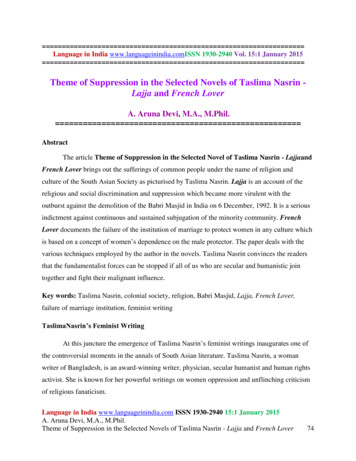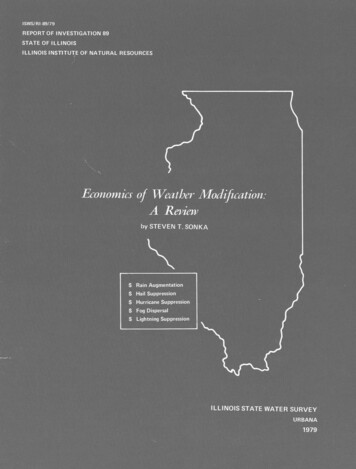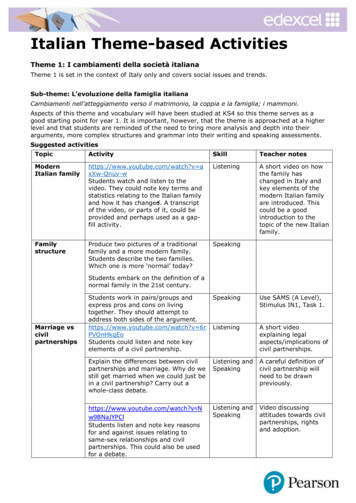
Transcription
Language in India www.languageinindia.comISSN 1930-2940 Vol. 15:1 January 2015 Theme of Suppression in the Selected Novels of Taslima Nasrin Lajja and French LoverA. Aruna Devi, M.A., M.Phil. AbstractThe article Theme of Suppression in the Selected Novel of Taslima Nasrin - LajjaandFrench Lover brings out the sufferings of common people under the name of religion andculture of the South Asian Society as picturised by Taslima Nasrin. Lajja is an account of thereligious and social discrimination and suppression which became more virulent with theoutburst against the demolition of the Babri Masjid in India on 6 December, 1992. It is a seriousindictment against continuous and sustained subjugation of the minority community. FrenchLover documents the failure of the institution of marriage to protect women in any culture whichis based on a concept of women’s dependence on the male protector. The paper deals with thevarious techniques employed by the author in the novels. Taslima Nasrin convinces the readersthat the fundamentalist forces can be stopped if all of us who are secular and humanistic jointogether and fight their malignant influence.Key words: Taslima Nasrin, colonial society, religion, Babri Masjid, Lajja, French Lover,failure of marriage institution, feminist writingTaslimaNasrin’s Feminist WritingAt this juncture the emergence of Taslima Nasrin’s feminist writings inaugurates one ofthe controversial moments in the annals of South Asian literature. Taslima Nasrin, a womanwriter of Bangladesh, is an award-winning writer, physician, secular humanist and human rightsactivist. She is known for her powerful writings on women oppression and unflinching criticismof religious fanaticism.Language in India www.languageinindia.com ISSN 1930-2940 15:1 January 2015A. Aruna Devi, M.A., M.Phil.Theme of Suppression in the Selected Novels of Taslima Nasrin - Lajja and French Lover74
Focus of This PaperIn this paper, Taslima Nasrin’s Lajja and French Lover are chosen for discussion.Through these novels, Nasrin brings out the sufferings of the common people under the name ofreligious and cultural practice of the society. She elaborately discusses the patriarchal institutionsand customs of Bangladeshi society. She has shown that the patriarchal institutions and customsof Bangladeshi society constitute the armour for the contending male rendering the femalehelpless. By unveiling the patriarchal agenda of subordinating women, and by introducing overtand covert strategies to subvert this agenda, she has pioneered the feminist discourse in SouthAsian society.LajjaLajja is a moving story of protest, passion, principle and persecution. The novel Lajjaportrays the horrendous and horrifying experience of a minority family, the Duttas- Sudhamony,Kironmoyee and their two children. Suranjan and Maya have to face so many trials and abusewithout any rhyme or reason- just only because of their Hindu identity in Bangladesh.Sudhamoy and His FamilySudhamoy an atheist, still believed with a native mix of optimism and idealism that hismotherland would not let him down. But the demolition of Babri Masjid in Ayodhya inDecember 1992 triggered a spurt of communal violence in Bangladesh. The Hindus, those likethe Duttas, became the victim of religious attack. Sudhamoy’s family which is the focal point inLanguage in India www.languageinindia.com ISSN 1930-2940 15:1 January 2015A. Aruna Devi, M.A., M.Phil.Theme of Suppression in the Selected Novels of Taslima Nasrin - Lajja and French Lover75
the novel depicts the pangs of sorrow and anxiety of their community through the personalsuffering of each member of his family.Sudhamoy’s house was completely ravaged and Maya, his grown up daughter wasforcefully kidnapped before his very eyes. Helpless Sudhamoy suffered a severe attack ofparalysis and his voice became slurred. Kironmoyee, who ran after the kidnappers, was hurt inthe head and she fell down unconscious on the road. Suranjan, the son, brought up with hisfather’s idealism was now at the verge of a helpless desperation and complete frustration. Heseeks the help of his friend Haider to trace Maya but realizes that he was of no help at all. Allattempts to find his sister were fruitless.Suranjan realizes that he had been a victim of religious discrimination at every step of hislife. He recalls how his brief stint with Parveen came to an end because he was a Hindu. Even hislast hope to make up for his wasted life by settling down with Ratna, a girl of his community toowas thwarted when she accepts a Muslim husband for herself. Blinded by a fury of frustration, heintends to rape a Muslim girl on victory day, the independence day of Bangladesh. But he onlyends up bruising, scratching and raping a poor prostitute Shamima who had to trade her body fora little food.During all these moments of crisis, Kironmoyee remains poised and nurse her husband asshe had done earlier. The mass exodus of 1947 was being repeated once again. Yet she isundaunted and courageous enough to reply to Aleya Begum’s suggestion to migrate to India thatshe wouldn’t do so because this was her own identity. Aleya was surprised at her reply butSudhamoy lying on the bed realizes that the two women can never be equal citizens in thiscountry.Still further, to his utter dismay, Sudhamoy finds his youthful son burning all the booksof Lenin, Marx, Dostoevsky, Nehru and Azad and many more. One more realization descends onhim that his idealist secular minded son has already been forced to the brink of religiousfanaticism. He was wounded and full of pain. He had been hurt by his family, society and aboveall his country and today he was burning himself in the surging flames of an inferiority complexwhich is typical of every ethnic community striving to survive.Language in India www.languageinindia.com ISSN 1930-2940 15:1 January 2015A. Aruna Devi, M.A., M.Phil.Theme of Suppression in the Selected Novels of Taslima Nasrin - Lajja and French Lover76
Suranjan was determined now not to cling to his father’s empty idealism anymore. Theinhuman cruelty and violence that had been heaped on his community at the wake of everynational disturbance must bring sense to his father. He implores him to leave such a nation thathas betrayed them again and againHowever much we call ourselves atheists, however much we callourselves humanists, these people out there will call us Hindus. They’llcall us bastards. The more we love this country, the more we think of itas our own, the more we’ll be forced into a corner. The more we love thepeople of this country, the more they will isolate us (Laj 213).Sudhamoy replies with concernIt will be a rootless existence [. . .] (Laj 214).To which his son’s question is emotionally charged.What will you do with your roots, Baba? If your roots are so powerful then whyare you hiding behind locked doors and windows? Will you stay this way all yourlife? (Laj 214).Sudhamoy’s replay was a firm “No” at the moment:Is India your father’s home or your grandfather’s? From your family, who the hellstays in India? Do you want to run away from your own homeland [. . .] doesn’t itmake you feel ashamed? (Laj 213).Later in the darkness of the night awakening of a sinister kind rises inside him and fillshis heart with fear and apprehension. Before his very eyes ivory tower of his lifelong idealismand sacrifice had crumbled to pieces. The nation of his blood and hope has let him down. Nowhe must leave with his wife and son for a life free from worries and anxieties, insecurity, tortureand death. He must deliver his battered and bruised family from the clutch of this ever- huntingnightmare. Sudhamoy’s decides to migrate to India.Language in India www.languageinindia.com ISSN 1930-2940 15:1 January 2015A. Aruna Devi, M.A., M.Phil.Theme of Suppression in the Selected Novels of Taslima Nasrin - Lajja and French Lover77
Thus, the story of Sudhamoy, Kironmoyee and their two children Maya and Suranjanmay be the fictional story of these fictional characters but it may reflect the story of thousands ofSudhamoys, Kironmoyees, Suranjans and Mayas in Bangladesh.Nasrin’s Narrative and the GoalTaslima Nasrin deals with the universal problem of fanaticism and fundamentalism. Though it isnot a very well-structured novel, it gives voice to the bold belief of Taslima Nasrin in her ownkind of secularism which tells us that if the Hindu and the Muslims are true followers of theirrespective religions, the communal violence can never, never take place. Her aim is never toexclude religion from her discourse of secularism, but to relate it to the shared cultural andnational identity. She seems to believe in Asghar Ali Engineer’s words that “Religion, if properlyunderstood and interpreted cannot be antagonistic to healthy secularism”.(qtd.in Naikar 155)Taslima makes a positive authorial intervention to bring about reconciliation between the twowarring communities, the Muslims and the Hindus - of Bangladesh.French LoverIn French Lover, the story revolves around an Indian bride and how she becomes aliberated woman afterwards. The novel focuses also on the less fortunate women who areconsidered objects of sex and gratification as many women in the developing countries. ThisLanguage in India www.languageinindia.com ISSN 1930-2940 15:1 January 2015A. Aruna Devi, M.A., M.Phil.Theme of Suppression in the Selected Novels of Taslima Nasrin - Lajja and French Lover78
novel describes how the indiscriminate sexual subjugation under different men and thefrustration and the self-pity at the inability of her own self to avert such pathetic situations and atthe selfish nature of the men in her sexual encounters, the betrayal of her beloved husband, friendand lover enlighten Nila, the innocent and ignorant dreamy bride into a hardcore feminist.Marriage is ExploitativeTaslimaNasrin’s novels present marriage as exploitative and it inevitably ends in divorce,preceded by husband’s polygamous marriage. It is through the perspective of displaced womanthat the institutions and practices of marriage and divorce are examined. She uses daily events asevidence for the conclusion that subordination and economic exploitation of women areembedded in patriarchal marital relationship.It is a universal fact that the tradition and custom of any nation demands marriage as thelegitimate institution to organize a family, the core part of which is centralized in a man and hiswife. Love and affection seems to be the password for emotional attachment and adjustment for ahappy married life. A couple of two different temperaments, if united in marriage, find it adifficult relationship where in the mutual adjustments and tolerance towards each other getsdissolved in an atmosphere of bleak disheartedness.Though there is much talk about women’s liberation it is a truth that society expects awoman to make comprises to keep the family intact and happy.Marriage is an obligation for womanhood but it makes a demand onwoman. She is expected to go through a long process of learning what shehas to learn in order to adapt herself to her new environment (qtd. inShirwadadkar 60).The institution of marriage, with all it expectations falls heavily on a woman. When itbecomes a battlefield between two egoistic individuals who are not ready to comprise, it provesthat fittest can survive. The strategy of survival varies from woman to woman. When shesuccumbs to the internal pressure of her own self and the external pressure from the society sheLanguage in India www.languageinindia.com ISSN 1930-2940 15:1 January 2015A. Aruna Devi, M.A., M.Phil.Theme of Suppression in the Selected Novels of Taslima Nasrin - Lajja and French Lover79
either commits suicide or loses her identity. The brave one does not want to make a compromiseand comes out of the shackles of the union.Nasrin’s NilaNasrin’s protagonist Nila proves to be a brave character and she wants to retain herindividuality against the destructive forces that threaten her identity as an individual and as awoman since marriage subjugates her. Through the character of Nila, Nasrin portrays the innerstruggle of an artist to express her feminine urge for self-expression.Story of Patriarchal ControlNasrin’s novel French Lover tells the story of the patriarchal control exerted on theprotagonist Nilanjana by her father, her husband Kishanlal and the domination of friends andlover. French Lover is her medium to convey her views on various sociological, political issueswhich encompass not only the fate of any nation but also that of women everywhere. It is arguedthat the roles assigned to men and women grant a dignified position to women. But, with rapidchanges, especially in the field of behavioural patterns, the whole harmony between them hasbroken down. The reason is that the traditional and modern values affect the position of womenin a society. Evidently, the traditional values, which insist on truthful devotion and love, havebeen continually evolving from generation to generation to cripple the growth of women andthwart the development of their personality. So, they work against ‘the mortiferous values’ inorder to safeguard their position. Their voice against the so-called ‘cultural conditioning’ istermed as ‘liberation’.Nila’s LifeNilanjana Mandal alias Nila, the heroine of French Lover, is a young lady of twentyseven. She is a woman who really searches for ‘true love’. Her life is marked by three stagesknown as the pre-marital, marital and post-marital stages. In all these stages, she is stunted andditched by man’s parochial and superior strength. But her mental maturity helps her to become awoman of courage and wisdom.Language in India www.languageinindia.com ISSN 1930-2940 15:1 January 2015A. Aruna Devi, M.A., M.Phil.Theme of Suppression in the Selected Novels of Taslima Nasrin - Lajja and French Lover80
Nila has been conditioned all her life by the example of her mother to cater to the men ofthe family. So initially in her marriage, she tries to do just that. She tries to cook and clean forher husband and lay herself prostrate before his desires. The conflict comes to a head when Nilagets a job for herself and then one day invites her friend’s home to a non-vegetarian meal cookedby her. But this creates a rift between husband and wife. ”. So, she positively makes up her mindthat she need not make any compromise and tries to be a dauntless woman.Breaking away from Mismatched MarriageNila’s decision to break away from the mismatched marriage and her refusal to accept thelife offered by Benoir and her self-discovery as an individual reveals that a female self candiscover herself as an individual. Nasrin introduces Nila as an apostle of the liberationmovement, advocating freedom from the tradition bound Indian woman. Nasrin’s heroine ismore a creature of instincts than of intellect. Her whole journey, thus, is flawed and centres onlyaround her. She accuses Benoir of being selfish without seeing that she too has managed tosurvive only because of her air-centeredness. All the men in the novel are blackguards andepitomes of selfishness. The novel shows its gender bias in this way. The characters believe inbeing superficial and here is very little, that is genuine about them.The Theme of Injustice against Women and Their OppressionInjustice against women and their oppression happens to be an equally important themein TaslimaNasrin’s novels. As a woman, she understands how the whole society dominated bymales creates paradigms the purpose of which is to subjugate woman and turn her into asubservient individual sans any freedom, sans any free will or choice. She confronts the nastytruth that women are mere passive objects in the matters of sex and other matters too. They areonly to be possessed and mastered. With her own experience and the experience of her sisters inBangladesh and not only Bangladesh but the world over, she realizes the fact that all theinalienable rights prescribed for human beings are denied to women because of a viciousconspiracy between religion and society in order to subjugate a woman’s free will. The texts andsub-texts of all the discourses in Islam regard woman as a very potent agent of corruption.Ironically, there is a parallel stream which presents woman as an erotic object to be possessedLanguage in India www.languageinindia.com ISSN 1930-2940 15:1 January 2015A. Aruna Devi, M.A., M.Phil.Theme of Suppression in the Selected Novels of Taslima Nasrin - Lajja and French Lover81
and enjoyed but who has no right for equal participation even in this intimate act of union. Thus,she is a double victim - on the one hand, she is taken to be possessed and used as an agent ofpleasure, and on the other hand, she is recognized as an agent of corruption and hence is requiredto be kept under control of man.A CrusaderTaslimaNasrin in her novels emerges as a crusader for women’s rights; she acts as achampion for women’s right of living with honour and independence in the framework of humandignity and equality. She also vociferously advocates a woman’s right to have a free choice inmatters of love, marriage, sex and in choosing friends. She talks of a woman’s natural right tolive in peace and harmony in a place which she can call her own.Male SupremacyIn her novel French Lover, Taslima Nasrin reveals that male supremacy is anacknowledged fact everywhere-in the East as well as the West. Nila, the protagonist leads adiscontented life with her husband Kishanlal who is an utter mismatch to her and emerges in thenovel to be a male chauvinistic prig. He keeps his wife confined in his home for his own pleasureand denies her any kind of freedom. Eventually, Nila rushes into the arms of a French BenoirDupont, but soon realizes that the Western males are also chauvinistic in their own refinedmanner. Mithu, a minor character in the novel, and Nila’s mother Molina serve as examples ofsuffering as they have to succumb to the tantrums and mechanisms of their patriarchal heads.Mithu commits suicide; Molina dies of cancer in want of proper medical treatment while Nilalives a wholly bleak existence at the end.Documenting the Failure of The Institution of MarriageThus, Taslima Nasin’s novels document the failure of the institution of marriage toprotect women in a culture which is based on a concept of women’s dependence on the maleprotector. By unveiling the patriarchal agenda of subordinating women and by introducing overtand covert strategies to subvert this agenda, Taslima has pioneered the feminist discourse inBangladeshi society.Language in India www.languageinindia.com ISSN 1930-2940 15:1 January 2015A. Aruna Devi, M.A., M.Phil.Theme of Suppression in the Selected Novels of Taslima Nasrin - Lajja and French Lover82
The novels of TaslimaNasrin, Lajja(1993) French Lover (2002) clearly reveals that shedoes not believe in the theory that art is for art's sake. She seems to believe that art is for life'ssake. She does not write fantasies or romantic stories to entertain an idle reader. She writes witha purpose and the purpose is to oppose and fight against oppression and gender bias. She is withthe victim and the marginalized and against irrational authority; it does not matter whether thisauthority is religious, social or patriarchal. TaslimaNasrin convinces the readers that thefundamentalist forces can be stopped is if all of us who are secular and humanistic join togetherand fight their malignant influence. Works CitedDhar, Sujor. Interview with TaslimaNasrin.June 6, 2002 Asia Times:India/ Pakistan at times.com.Datta, Sudipta. “A Search for Lilies”. The Hindu 4 August 2002.Giles E, Mary. The Feminist Mystic.NewYork: The CrossRoad publishing Group, 1983.Khatri C L. World Literature in English Critical Responses.Delhi: Book Enclave, 2006.Miller, Baker Jean.Towards a New Psychology of Women.Boston: Beacon, 1976.Naikar, Basavaraj. Indian English Lierature.4vol. Delhi:Atlantic Publishers& Distributors, 2007.Nasrin, Taslima. Lajja.New Delhi: Penguin Books, 1994. .French Lover.New Delhi: Penguin Books, 2002.Prasad, Amarnath.Critical Essays:Indian Writing in English.New Delhi: Sarup&Sons Publisher, 2003.Ray K, Mohit. Studies in Commonwealth Literature. New Delhi:Atlantic Publishers & Distributors, 2007.Shirwadkhar, Meena. Image of Woman in Indo Anglian Novel.New Delhi: Sterling, 1979.Language in India www.languageinindia.com ISSN 1930-2940 15:1 January 2015A. Aruna Devi, M.A., M.Phil.Theme of Suppression in the Selected Novels of Taslima Nasrin - Lajja and French Lover83
Sochen, Joan. Movers And Shakers: American Thinkers.Toronto: Fitzhenry and Whiteside Ltd, 1973.Talwar, SreeRashmi. Women’s Space, The Mosaic World ofMargaret Drabble and NayantaraSahgal. Delhi:Creative Publication, 1997. A. Aruna Devi, M.A., M.Phil.Assistant Professor of EnglishSri Ramasamy Naidu Memorial CollegeSattur-626203Tamil NaduIndiaarutheiva15@gmail.comLanguage in India www.languageinindia.com ISSN 1930-2940 15:1 January 2015A. Aruna Devi, M.A., M.Phil.Theme of Suppression in the Selected Novels of Taslima Nasrin - Lajja and French Lover84
Language in India www.languageinindia.com ISSN 1930-2940 15:1 January 2015 A. Aruna Devi, M.A., M.Phil. Theme of Suppression in the Selected Novels of Taslima Nasrin - Lajja and French Lover 75 Focus of This Paper In this paper, Taslima Nasrin's Lajja and French Lover are chosen for discussion. Through these novels, Nasrin brings out the sufferings of the common people under the name of










